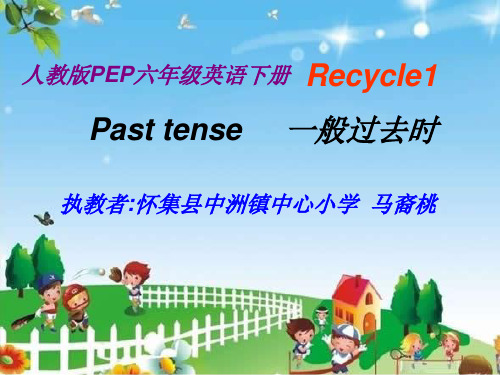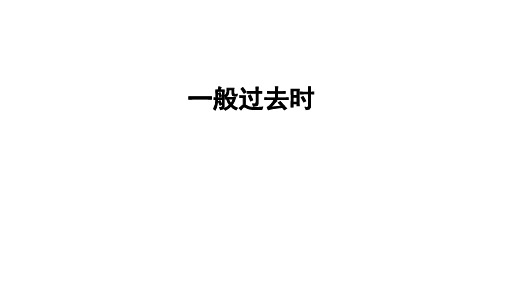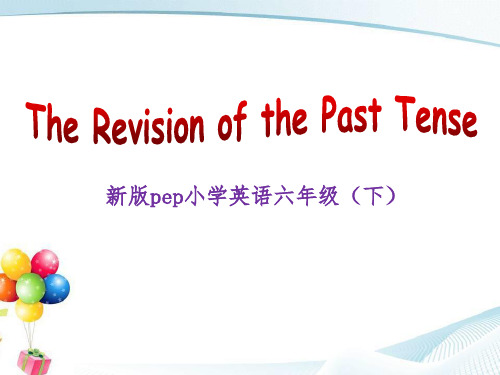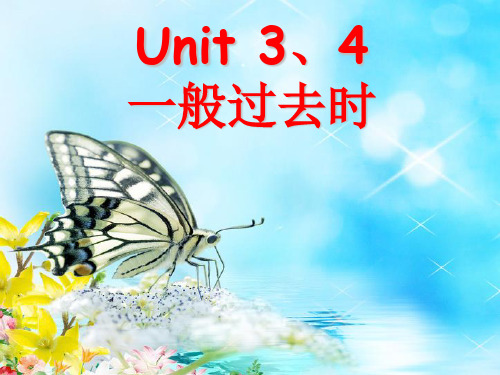六年级英语下册 一般过去时态课件 人教PEP
合集下载
PEP六年级英语下册小学时态总复习ppt课件

He doesn't like English. 18
②实义动词:
Do (you/we/they)
一般疑问句:
+主语+动词原形+其它?
Does (he/she/it/人名)
Do you like English? Does he like English?
19
注意
当主语是第三人称单数时, 动词要用第三人称单数形式,即 动词加-s/es。除此之外都用动 词原形。
B. washes
C. washed
D. washing
13
一般现在时
14
一般现在时的基本用法:
1、概念: ①.表示经常或习惯性的动作。
John gets up at 6:30 every day.
②表示客观存在的真理或科学事实。 The earth moves around the sun.
③表示现在的状态、能力、性格、个性。 I am a worker. She likes noodles.
9. It's 5 o'clock now. We a_r_e_h_a_v_in_g_(have)
supper now.
10._I_s_Helen__w_a_s_hi_n_g_(wash )clothes?
Yes ,she is .
9
现在进行时-ing
am is are -ing What are you _C____?
Are you a student?
17
②实义动词:
(I/You/We/They) 动词原形 肯定句:主语 +
+其它.
(He/She/It/人名) 动词第三人称单数
PEP六年级英语下册小学时态总复习ppt课件

3.现在进行时的构成(基本结构)
be(am,is,are)+动词-ing 肯定句:主语 + be + 动词-ing (+其它).
I am watching TV now. 否定句:主语+be(am,is,are)+not+动词-ing
(+其它). I am not watching TV now.
Are you精选a版课件sptptudent?
17
②实义动词:
(I/You/We/They) 动词原形 肯定句:主语 +
+其它.
(He/She/It/人名) 动词第三人称单数
I like English./ He likes English.
don't
否定句:主语+
+动词原形 +其它.
doesn't
1、概念: ①.表示经常或习惯性的动作。
John gets up at 6:30 every day.
②表示客观存在的真理或科学事实。 The earth moves around the sun.
③表示现在的状态、能力、性格、个性。
I am a worker.
She likes noodles.
精选版课件ppt
一般疑问句:Be(Am,Is,Are)+主语+动词-ing (+其它)? Are you精选版w课a件ptptching TV now? 5
根据图画利用所学的现在进行时造句。
Mike play computer games now
Mike is playing computer games now.
新人教(PEP)版六年级英语下册《一般过去式》公开课课件_8

肯定回答:Yes, it iБайду номын сангаас. 否定回答:No, it isn't.
一般过去时
一般过去时的特殊疑问句
人教PEP版英语六年级下册第二单元
1、特殊疑问词+ did+主语+动词原形+其他 常用的特殊疑问词:where、what、 when、 who 、how e.g. Where did you go last week?
人教PEP版英语六年级下册第二单元
一般过去时
一般过去时
人教PEP版英语六年级下册第二单元
一般过去时
人教PEP版英语六年级下册第二单元
Unit 2 Last weekend
Last weekend I went to the zoo. What did you do last weekend? I saw a film and played ping-pong. What did you do last weekend?
→He was not happy last night.
一般过去时
人教PEP版英语六年级下册第二单元
一般过去时的疑问句
①谓语动词是行为动词,在句首加Did,动词变为原形.
e.g.Mike went to the park last week.
→Did Mike go to the park last week?
一般过去时
一般过去时记忆口诀:
人教PEP版英语六年级下册第二单元
一般过去时并不难,过去动作、状态记心间。
动词要用过去式,时间状语句末站。
否定句很简单,didn't 站在动原前,其它部分不要变。
一般疑问句也好变,did放在句子前,主语、动词原形、其 它部分依次站。
英语人教版六年级下册一般过去时复习课件

watch-watched
第三关
I am a little writer. 我是一个小作家.
Shuqing Tingting Haiqian Xiaobing Guomei and Jinfen Jiayi and Haiqian
Wei Jian Qihao
Fangmin
Last Friday
,we had a PE class. _____
Can you be a good doctor? 1.My mother watch ___ TV last night._______ plai-played 2.John ____ plaied basketball yesterday.______ stoped-stopped 3.They stoped at the red light.__________ ____ liveed-lived ____ in China last year.______ 4.Mr. Joe liveed went-go 5.Did you went ___ fishing last weekend?____ ___ took pictures last winter 6.We don’t don’t-didn’t holiday.__________
一般过去时
表示过去某个时刻发生的动作或所处的状态。
时间标志词:yesterday last · · ·
陈述句句子结构:
· · · ago
(1)主语+be (过去式was/were)十其他 (2)主语十动词过去式十其他 如:We were happy last Friday.
We played football yesterday.Fra bibliotek巧记妙学
第三关
I am a little writer. 我是一个小作家.
Shuqing Tingting Haiqian Xiaobing Guomei and Jinfen Jiayi and Haiqian
Wei Jian Qihao
Fangmin
Last Friday
,we had a PE class. _____
Can you be a good doctor? 1.My mother watch ___ TV last night._______ plai-played 2.John ____ plaied basketball yesterday.______ stoped-stopped 3.They stoped at the red light.__________ ____ liveed-lived ____ in China last year.______ 4.Mr. Joe liveed went-go 5.Did you went ___ fishing last weekend?____ ___ took pictures last winter 6.We don’t don’t-didn’t holiday.__________
一般过去时
表示过去某个时刻发生的动作或所处的状态。
时间标志词:yesterday last · · ·
陈述句句子结构:
· · · ago
(1)主语+be (过去式was/were)十其他 (2)主语十动词过去式十其他 如:We were happy last Friday.
We played football yesterday.Fra bibliotek巧记妙学
六年级下册英语课件-一般过去时 全国通用 (共29张PPT)

1.外加助动词did后,动词须返回原形。
Did he went to school yesterday?
F
Did he go to school yesterday? T
2.简略回答用助动词did/didn’t代替
行为动词。
Did he find the boy yesterday?
-Yes, he did.
don’t/ doesn’t
didn’t
do/ does
did
谓语构成
1.动词 be
was , were
2.动词 have, has had
3.助动词do, does did
4.行为动词用过去式
一般过去时以动词的过去式来表示,
没有人称和数的变化.(was,were除外)
I went to school yesterday.
用法
1.在过去某一时间内发生的动作:
He got home at ten o’clock last night. 2.表示过去经常或反复发生的动作, 常与often,always等表示频度的 间状语连用:
I often got up very early at that time.
3.表示已故人所做的事情。
他每天都吃水果。
He __h_as__ fruit every day.
昨天他吃了3个苹果。
He _h_a_d__ 3 apples yesterday.
have/ has
had
I get up at 6:30 every morning. I _g_ot_ up at 9:00 last Sunday.
went
has did got
5. hope hoped 15. come came
人教PEP版英语六年级下册小升初复习一般过去时(课件)

Was/Were+主语+其他? 肯定回答:Yes, 主语
—Was he a teacher?他曾经是位 老师吗?
+was/were.
一般 否定回答:No, 主语
疑问 句
+was/were+not. Did+主语+动词原形+其 他?
—Yes, he was. /No, he wasn’t. 是的, 他是。/不, 他不是。
—Did Lingling get up at 6:30 yesterday?
肯定回答:Yes, 主语+did. 玲玲昨天是 6:30 起床的吗?
否定回答:No, 主语
—Yes, she did. /No, she didn’t.
+did+not.
是的, 她是。/不, 她不是。
特殊疑问词+was/were+ 特殊 主语+其他? 疑问
3. Li Lei sang and danced yesterday. (改为一般疑问句) Did Li Lei sing and dance yesterday?
A. play
B. played
C. will play
( )2. We
school at nine last night.
A. leaved
B. left
C. leaving
1. 本题考查一般过去时的肯定句。由句中的时间状语 last night(昨晚)可知, 玩游戏发生在过去, 所以句中动词需要变为过去 式。A 选项为动词原形;B 选项为动词过去式;C 选项为动词在一般 将来时中的用法。2. 考查一般过去时的用法, 由 last night 可知时间 为过去时, 所以句中的 leave 应用过去式, leave 为不规则动词, 其过 去式为 left。
小学英语一般过去时时态复习(课件)-2023-2024学年人教PEP版英语六年级下册

六年级下册
语法专项:一般过去时
Shirley Wu
01 定义
目 02 句型结构 录 03 动词过去式变化规则
04 练习提升
Part 1
定义
定义
一般过去时表示过去发生的动作或存在的状态。 常与过去的时间状语连用。
时间标志词
1. yesterday, the day before yesterday... 2. last 系列:last week,last year,last month... 3. ago系列:two days ago, two years ago... 4. in +过去的年份:In 1987.
练习提升
四、句型转化
1. He is a little boy . (ten years ago) (1)改为否定句:
He was a little boy ten years ago.
He was not/wasn’t a little boy ten years ago.
(2)改为一般疑问句:
Part 2
句型结构
句型结构
1.be动词: 主语+be(was/were)+其它. 如:My father was short. 2.实义动词: 主语+实义动词(过去式)+其它. 如:My father watched TV yesterday.
Grammar
动词的一般过去时态表示过去发生的动作、情况或存在的 状态。行为动词(即实义动词)的过去式没有人称和数的 变化。
二、单项选择。
1. We ____ a school trip last weekend.
A. has B. had C. haved
语法专项:一般过去时
Shirley Wu
01 定义
目 02 句型结构 录 03 动词过去式变化规则
04 练习提升
Part 1
定义
定义
一般过去时表示过去发生的动作或存在的状态。 常与过去的时间状语连用。
时间标志词
1. yesterday, the day before yesterday... 2. last 系列:last week,last year,last month... 3. ago系列:two days ago, two years ago... 4. in +过去的年份:In 1987.
练习提升
四、句型转化
1. He is a little boy . (ten years ago) (1)改为否定句:
He was a little boy ten years ago.
He was not/wasn’t a little boy ten years ago.
(2)改为一般疑问句:
Part 2
句型结构
句型结构
1.be动词: 主语+be(was/were)+其它. 如:My father was short. 2.实义动词: 主语+实义动词(过去式)+其它. 如:My father watched TV yesterday.
Grammar
动词的一般过去时态表示过去发生的动作、情况或存在的 状态。行为动词(即实义动词)的过去式没有人称和数的 变化。
二、单项选择。
1. We ____ a school trip last weekend.
A. has B. had C. haved
六年级下册英语PPT课件-小升初语法复习—时态 人教PEP版

一般现在时 正在进行时 一般将来时 一般过去时
PART ONE
一般现在时
概念
一般现在时表示经常性或习惯性的动作。 I get up at six every day.
We study English.
Mary likes Chinese.
一般现在时的构成
1.由be动词构成 主语+be(am,is,are)+其他.如: I am a girl.我是一个女孩。
标志词
last weekend last night last Monday yesterday the day before yesterday
课堂问答
单击此处添加您的文字内容,或复制文本粘贴至此
She _____ (like) music.Now she _____ (sing). Bob _______(like) cooking. My mother _________________ (cook)some food now. They _______(have) the same hobby. My sister _______(look) after her baby carefully. The boy __________________ (draw)a picture now You always _______(do) your homework well. Mary ________ (visit) her grandparents tomorrow. We ________ students three years ago. Ling Ling ________ eleven years old last year.
6.在中国,人工智能已被纳入国家科 研计划 。
六年级下册英语课件-一般过去时复习-人教pep.ppt

dangerous(危险的). Of course, we bought many gifts
for our friends. We had a good time. We liked Qingdao very much.
Challenge3 Can you write the original form of the words?(你能写出下列过去式的原型吗?)
新版pep小学英语六年级(下)
T:I say am Ss:I say was. T:I say do Ss:I say did. T:I say go Ss:I say went. T:I say are Ss:I say were. T:I say read Ss:I say read. T:I say take Ss:I say took.
swam in took bought visited my
ate
played in the
the sea pictures gifts grandparents seafood(海鲜)
sea
Grade ...
past
Grade 6
now
Grade ...
future
Challenge2 Read and circle:从文中找出
如:dance---danced love----loved
live---lived
like----liked
动词过去式的规则变化
3.以“辅音字母+y”结尾的,变y为i,再加-ed,
如:study---studied
try---tried
cry---cried
worry---worried
动词过去式的规则变化
for our friends. We had a good time. We liked Qingdao very much.
Challenge3 Can you write the original form of the words?(你能写出下列过去式的原型吗?)
新版pep小学英语六年级(下)
T:I say am Ss:I say was. T:I say do Ss:I say did. T:I say go Ss:I say went. T:I say are Ss:I say were. T:I say read Ss:I say read. T:I say take Ss:I say took.
swam in took bought visited my
ate
played in the
the sea pictures gifts grandparents seafood(海鲜)
sea
Grade ...
past
Grade 6
now
Grade ...
future
Challenge2 Read and circle:从文中找出
如:dance---danced love----loved
live---lived
like----liked
动词过去式的规则变化
3.以“辅音字母+y”结尾的,变y为i,再加-ed,
如:study---studied
try---tried
cry---cried
worry---worried
动词过去式的规则变化
六年级一般过去时PPT

have/has----had come---came see---saw
read----read feel----felt write---wrote
写出下列动词的过去式或动词原形。
1. go_____ 2. is_____
3.buy_____
2. 4.swim_____ 5. have ______
stayed
played
said
4、以重读闭音节结尾的动词,末尾只有 一个辅音字母,双写这个辅音字母再加-ed。
stop---stopped shop---shopped
5、不规则动词变化
am is ----was are----were begin ----began
do----did
go----went say---said
6. We ___ to the zoo and __a lot of animals yyeesstteerrddaayy. A. go; see B. went; saw C. goes; sees
7. What did you do last weekend ? --I _________ A. read a book B. wash the clothes C. go fishing
6. 16. like _______ 17. write _______ 18. cry ______
7. 19. study _____ 20. ask __________ e ______
用单词的适当形式填空。 1. ________ you ________(water) the flowers yyeesstteerrddaayy? 2. 2. Su Hai _________(go) for a walaksltasStuSnudnadyay. 3. Mike didn’t ________(finish) his homework yesterday. 4. I _______ (pick) apples on the tree last month. 5. I _______(is) ten years old last year. Oon that day, I _______(blow) the candles out. 6. There ________(are) five books on the desk aa mmoommeenntt aaggoo. 7. They ________(sweep) the floor just now. 8. I _________ (meet) Miss White the day before yesterday. 9. I _______ (wash) clothes last weekend. 10. What ddiidd you do on your holiday? I ________ (go) swimming.
小学PEP六年级英语过去时讲解课件

The Simple Past Tense
一般过去时的讲解
观察句子,找规律
I went He was They played
主语 + 动词过去式 一般过去时
to the park yesterday . very tired last night. football last weekend .
ቤተ መጻሕፍቲ ባይዱ般过去时的定义
No , he wasn't .
• 一般过去时表示过去发生的动作、行为 或曾经存在的状态。 常与表示过去的时间状语连用,如: yesterday , two days ago , last weekend /Sunday等。
•
动词过去式的构成
一、规则变化 1.一般在动词末尾加-ed,如:cook-cooked. 2.以不发音的e结尾的,直接加d,如:like-liked. 3.以重读闭音节结尾,呈现“辅,元,辅”结构的动 词,先双写末尾的辅音字母,再加-ed,如:stopstopped. 4.以“辅音字母+y”结尾的,变y为i, 再加-ed,如: study-studied. 二、不规则变化 常用的动词过去式有 do/does-did , am/is-was , arewere , go-went , read-read ,swim-swam等。 这些不规则变化需要我们单独记忆。
疑问句:
1)be动词的过去式(was,were)+主语+...? eg: ---Was he very tired yesterday? ---Yes, he was. /No, he wasn't. 2) Did+主语+动词原形+...? eg: ---Did she swim yesterday ? ---Yes, she did./ No, she didn't .
一般过去时的讲解
观察句子,找规律
I went He was They played
主语 + 动词过去式 一般过去时
to the park yesterday . very tired last night. football last weekend .
ቤተ መጻሕፍቲ ባይዱ般过去时的定义
No , he wasn't .
• 一般过去时表示过去发生的动作、行为 或曾经存在的状态。 常与表示过去的时间状语连用,如: yesterday , two days ago , last weekend /Sunday等。
•
动词过去式的构成
一、规则变化 1.一般在动词末尾加-ed,如:cook-cooked. 2.以不发音的e结尾的,直接加d,如:like-liked. 3.以重读闭音节结尾,呈现“辅,元,辅”结构的动 词,先双写末尾的辅音字母,再加-ed,如:stopstopped. 4.以“辅音字母+y”结尾的,变y为i, 再加-ed,如: study-studied. 二、不规则变化 常用的动词过去式有 do/does-did , am/is-was , arewere , go-went , read-read ,swim-swam等。 这些不规则变化需要我们单独记忆。
疑问句:
1)be动词的过去式(was,were)+主语+...? eg: ---Was he very tired yesterday? ---Yes, he was. /No, he wasn't. 2) Did+主语+动词原形+...? eg: ---Did she swim yesterday ? ---Yes, she did./ No, she didn't .
英语人教版六年级下册《Last Weekend》一般过去时课件

• 3.表示已故人所做的事情。
Comrade Lei Feng did good deeds in his life. (雷锋同志做了一生的好事。)
• 4. 表示过去所发生的一系列的动作,而这
一系列的动作是从现在的角度来考虑的,不 是从动作相互之间的关系这一角度来考虑的。 Miss Liu got up at seven o’clock this morning, dressed, had breakfast, and went to work.
巩固练习
.用所给的动词的适当形式填空。 ⒈He _visited__(visit) the Great Wall last year. 2.We___had__(have) a good time yesterday. 3.We often _went _(go) to school by bus last year. 4.I __lived_(live)in the village when I was a child. 5.Mike __saw (see) a big tiger in the nature park last year. 6.Sam_ did_(do) the housework yesterday. 7._Did_(do) you _enjoy__(enjoy) yourself yesterday? 8.__Did_(do)you _play _(play) the violin in the artroom yesterday?
一般过去时态常用的时间状语 一般过去时态常用的常见句型
• 一般过去时态表示过去发生的动作、情
况或存在的状态。行为动词(即实义动 词)的过去式没有人称和数的变化。
谓语动词的构成形式
小学六年级下册一般过去时PPT(精讲)

(4)in加年份:in 2009/2008/1986/1220等,2016前全用一般过去时。
• 例:She _w__e_n__t____( go) to turpan in 2014.
(5) when字连:when I was a child等 when字后面都是过去时,也要用一 般过去时。
例:I l_e_a__r_n_t___ ( learn ) to swim when I was a child
否定句:__W_e__s_a_n_g_d_i_d_n_’t__si_n_g_a_n_y__E_n_g_li_s_h_s_o_n_g_s_y_e_s_t_e_r_d_a_y_.______ 一般疑问句:_D_i_d_y_o_u__si_n_g_a_n_y__E_n_g_li_s_h_s_o_n_g_s_y_e_s_t_e_r_d_a_y_?_________ 肯、否定回答:__Y_e_s_,_w_e__d_id_._______N__o_, _w__e_d_i_d_n_’t_. ____________
11. go 12. have 13. do 14.get 15. come 16. say 17.see 18. put 19. read 20.take
went has did got came said
saw put
read took
21.buy 22.sing 23.hear 24.make 25. find 26.break 27.think 28.fall 29.write 30.be
-ed读作/d /
lived /lIvd//
play ed /pleI d//
2021/6/18
3.在以/t/或/d/结尾的规则动词后,
-ed读作/Id /
• 例:She _w__e_n__t____( go) to turpan in 2014.
(5) when字连:when I was a child等 when字后面都是过去时,也要用一 般过去时。
例:I l_e_a__r_n_t___ ( learn ) to swim when I was a child
否定句:__W_e__s_a_n_g_d_i_d_n_’t__si_n_g_a_n_y__E_n_g_li_s_h_s_o_n_g_s_y_e_s_t_e_r_d_a_y_.______ 一般疑问句:_D_i_d_y_o_u__si_n_g_a_n_y__E_n_g_li_s_h_s_o_n_g_s_y_e_s_t_e_r_d_a_y_?_________ 肯、否定回答:__Y_e_s_,_w_e__d_id_._______N__o_, _w__e_d_i_d_n_’t_. ____________
11. go 12. have 13. do 14.get 15. come 16. say 17.see 18. put 19. read 20.take
went has did got came said
saw put
read took
21.buy 22.sing 23.hear 24.make 25. find 26.break 27.think 28.fall 29.write 30.be
-ed读作/d /
lived /lIvd//
play ed /pleI d//
2021/6/18
3.在以/t/或/d/结尾的规则动词后,
-ed读作/Id /
六年级下英语课件-一般过去时-人教pep版

Unit 3、4 一般过去时
• when do you eat breakfast ? • I eat breakfast at 7:00.
• when did you eat breakfast yesterday?
• I ate breakfast at 6:30.
用get up—got up 练习说话。
• what do you do on the weekend ? • I clean my room on the weekint?
PowerPoint通俗讲就是Microsoft Office旗 下的一款制作和播放幻灯片的软件; 用途:创建和放映演示文稿。
Step 3
选择适当图 片作为背景
制作幻灯片母版实例
打开一个空白母版
挑选一张满意背景
标志
分隔线
2010.04.29
日期
福耀集团
单位
幻灯片设计
二、幻灯片中的文字
1 文字内容要简洁、突出重点 2 要采用合适的字体、字号与字形 3 文字和背景的颜色搭配要合理
文字要少 公式要少 字体要大
案例:小小标签,一波 三折
一般过去时:用来描述过去某个 时间发生的动作或存在的状态。
• I ate breakfast at 6:30 yesterday.
• 过去时间:yesterday , last week , last weekend , last year , last Sunday .
返回
动词过去式构成分类
fly-flew take-took have-had eat-ate get-got
3、以“辅音字母+y” 结尾的动词是先将y变 i,再加-ed.
study--studied
• when do you eat breakfast ? • I eat breakfast at 7:00.
• when did you eat breakfast yesterday?
• I ate breakfast at 6:30.
用get up—got up 练习说话。
• what do you do on the weekend ? • I clean my room on the weekint?
PowerPoint通俗讲就是Microsoft Office旗 下的一款制作和播放幻灯片的软件; 用途:创建和放映演示文稿。
Step 3
选择适当图 片作为背景
制作幻灯片母版实例
打开一个空白母版
挑选一张满意背景
标志
分隔线
2010.04.29
日期
福耀集团
单位
幻灯片设计
二、幻灯片中的文字
1 文字内容要简洁、突出重点 2 要采用合适的字体、字号与字形 3 文字和背景的颜色搭配要合理
文字要少 公式要少 字体要大
案例:小小标签,一波 三折
一般过去时:用来描述过去某个 时间发生的动作或存在的状态。
• I ate breakfast at 6:30 yesterday.
• 过去时间:yesterday , last week , last weekend , last year , last Sunday .
返回
动词过去式构成分类
fly-flew take-took have-had eat-ate get-got
3、以“辅音字母+y” 结尾的动词是先将y变 i,再加-ed.
study--studied
- 1、下载文档前请自行甄别文档内容的完整性,平台不提供额外的编辑、内容补充、找答案等附加服务。
- 2、"仅部分预览"的文档,不可在线预览部分如存在完整性等问题,可反馈申请退款(可完整预览的文档不适用该条件!)。
- 3、如文档侵犯您的权益,请联系客服反馈,我们会尽快为您处理(人工客服工作时间:9:00-18:30)。
PRACTISE
改写句子: 1、Lucy did her homework at home.(改否定句) didn’t do Lucy _______ _______ her homework at home. 2、He found some meat in the fridge.(变一般疑问句) Did find any ______ he __ayed there for a week.(对划线部分提问) How long did stay ______ ______ _____ she _____ there? 4、There was some orange in the cup.(变一般疑问句) Was any _____ there _____ orange in the cup?
告诉 来 说 游泳 发现 去 成为
tell—told come—came say—said swim—swam find– found go -- went become--became
• • • • • •
2. 行为动词的一般过去式。 A. 规则动词的变化规则: (1)一般动词直接加-ed (2)以e结尾的动词直接加-d (3)以辅音字母加y结尾的变y为i再加ed (4)以重读闭音节结尾,词尾只有一个辅音 字母,双写最后这个辅音字母,再加ed
• B. 规则动词过去式的发音: • 在清辅音后读/t/,在元音和浊辅音后读/d/, 在辅音/t/,/d/后读 /id/。 • C. 不规则动词变化需参看不规则动词表逐一熟 记。(一般和过去分词一起记忆)。 • D. 基本句式:
句型转换
• • • • • • • • • • 1. Xiao Lin went fishing this morning.(改为一般疑问句) 2. We visited our teacher last night.(就划线部分提问) 3. He had lunch at school.(改为否定句) 4. There was some milk in the bottle. (就划线部分提问) 5. He went to that city with his uncle. (改为一般疑问句)
• 4. The window was open and a bird into my room. • A. flies B. flys C. flyed D. flew • 5. Both my parents born in Tianjin and I born in Shanghai. • A. are, am B. was, were C. were, was D. did, did
小学英语六年级 一般过去时态专题
(一)一般过去时的用法
1. 通常表示过去发生的而现在已经结束的事件、动作或情况。 Eg. Sam phoned a moment ago. I got up at eight this morning. 2. 还可以表示刚刚发生的事情而没说明时间。 Eg. Did the telephone ring? Who left the door open? 3. 也可以表示过去的习惯性动作。 Eg. I smoked 40 cigarettes a day till I gave up.
常用时间
常与一般过去时态连用的时间有:
yesterday yesterday morning (afternoon, evening…) last night two days ago, years ago… in 1990, (week, month, year…) a week ago, three
(in 1998…)
(三)典型例题
• ---- Your phone number again? I ___ quite catch it. • ---- It's 69568442. • A. didn't B. couldn't C. don't D. can't • 答案A. 本句虽没有明确的时间状语,但从语意 上看出,在听的时候没有听懂这个动作发生在 过去,因此应用过去时。
That’s great√
(四)课堂练习
• 一. 单选。 • 1. He usually goes to school by bus, but yesterday he a taxi. • A. takes B. took C. gets on D. got on • 2. I some books about Amerian history from our library last week. • A. borrowed B. took C. brought D. lent • 3. It was warm, so I my coat. • A. put on B. put up C. took off D. take off
不规则动词表 Infinitive am is are begin break bring build buy can Past tense was were begun broke brought built bought could Infinitive catch come do draw drink drive eat fall Past tense caught came did drew drank drove ate fell
(二) 一般过去时的构成:
1. 有be的句子 am/is—was are—were eg.肯定句:He was a cook 2 years ago. They were at school yesterday. 否定句:He was not a cook 2 years ago. They were not at school yesterday. 一般疑问句:Was he a cook 2 years ago? Yes, he was. No, he wasn’t. Were they at school yesterday? Yes, they were. No, they weren’t.
想要 问 参观 变 爬 跳 下雪
want -- wanted ask—asked visit—visited turn—turned climb—climbed jump—jumped snow—snowed
居住 同意 有 做 花费 唱 给
live -- lived agree—agreed have—had do—did spend—spent sing—sang give—gave
